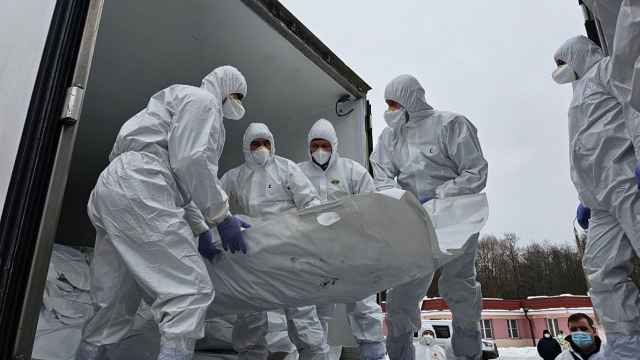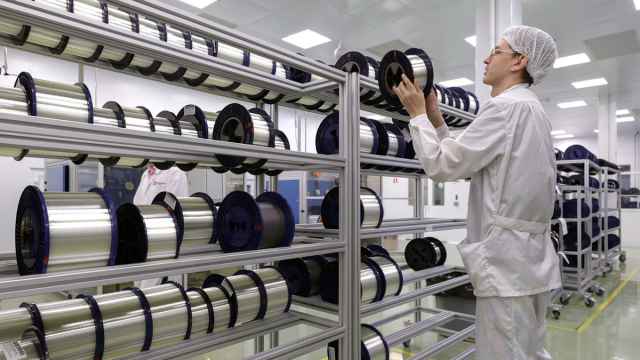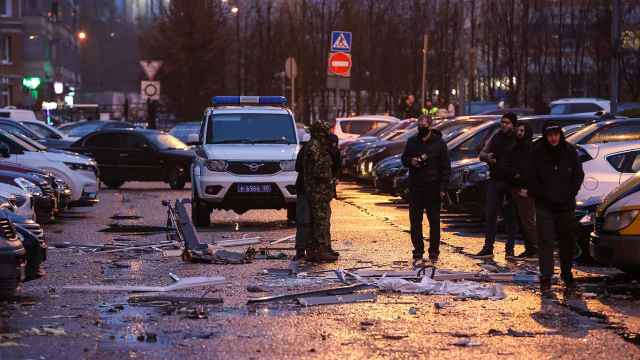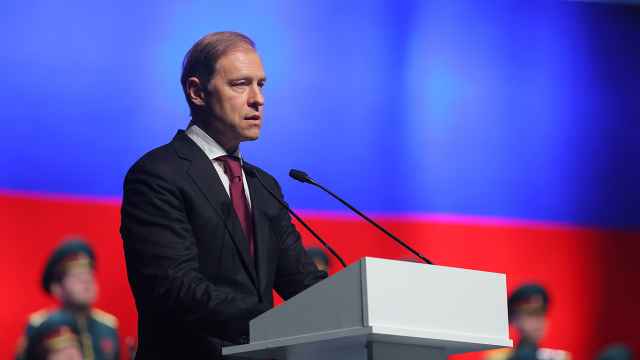A popular post that appeared in Russian social networks a while back is likely to hit home with anyone who has purchased substandard groceries in Moscow. In a brief but emotional text, an unidentified author gives a colorful description of his experience at one of the city's retail chains where he had bought a package of smoked sturgeon that turned out to be spoiled.
The author of the post, who returned the product to the store manager, witnessed him compel the responsible shop assistant to eat the fish to teach him a lesson.
If true, such quality control methods could be adopted by other grocery outlets in the city, since products in most of them leave much to be desired, longstanding Moscow expat Hawk Sunshine said jokingly.
To get high-quality goods and services in the city, one has to pay dearly, said Sunshine, a managing director of the portfolio investment department at financial company Metropol.
"In Moscow, very little is offered in the medium-price segment," he said, adding that he goes to Paris to buy clothes.
Crazy Expensive Coffee
His case is confirmation of recent figures released by global human resources consulting firm Mercer, which ranked Moscow second on the list of 214 cites with the highest cost of living for expatriates.
In its annual survey published Tuesday, Mercer provided a cost overview for various goods and services around the globe. In each location the company measured prices for more than 200 items, including housing, food, clothes and entertainment.
The survey showed that Moscow outdid other world capitals like London and New York by the cost of living for foreigners working in the city. Russia's capital also has the highest prices in a number of categories of goods, the survey said.
For example, the price of a cup of coffee in a Moscow cafe including tips appeared to be higher than in any other city in the top 10 on the list, peaking at $8.29, according to the report. In Tokyo, which ranks third on the list, one has to pay $6.98 for a shot of Java, while the price in Geneva, at seventh place, is $6.52.
To collect price information, Mercer sends specially trained agents to the surveyed cities, said Catherine Gervais, a senior consultant at the company. They are provided with a list of shops and restaurants that are frequented by expats and a list of brands they need to buy.
Another example of Moscow's exorbitant costs, according to the survey, is the price of an issue of an international daily newspaper, which stands at $9.95 — the highest compared with all other top-10 cities.
But the deciding factor that determined Moscow's high place in the ranking is rental rates for housing — typically the most significant cost for expatriates in any city.
"A luxury two-bedroom unfurnished apartment rental for one month in Moscow is $4,600 a month or 14 times more than in Karachi," according to Mercer's statement. An average rate for high-end, three-bedroom apartments offered by Moscow landlords reached $8,000 a month, the survey said.
This is, however, almost half the size of a similar rate in Angola's capital Luanda, which has the highest cost of living for expats among the surveyed locations. Other cities that made it to the top-10 list are N'Djamena in Chad, Singapore, Hong Kong, Zurich, Bern and Sydney. Locations like London, New York and Paris did not make the top 10 in the ranking, Mercer said. But the firm declined to disclose the places of those cities on the list, citing the company policy, which requires that customers pay for that information.
Rental Market Driver
Meanwhile, Moscow-based foreigners confirmed that housing is one of the most significant cost items in the city.
"As a long term Moscow expat, I can say that the main cost for most expats living in Moscow is housing," said Kerry Irwin, general director for Russia and CIS at public relations firm Edelman.
She pointed out that many foreigners chose central locations where housing costs are high. "For those with families who prefer to live in the greener compounds like Rosinka or Pokrovsky Hills, the cost of living is also extremely high for a townhouse or a small house," said Irwin, who has been living in Moscow for 14 years.
The demand for high-budget apartments, which came primarily from foreigners in the first half of this year, was concentrated in the districts like Arbat and Kropotkinskaya metro station near the Kremlin, as well as on Tverskaya Ulitsa and in Zamoskvorechye district, according to real estate agency IntermarkSavills.
Most tenants were looking for a fully furnished apartment, although families with children who arrived in Russia on a contract base tended to choose unfurnished housing that they later customized to their needs, the company said in a report on Moscow's high-end residential market issued last week.
An average monthly rental rate that landlords demanded for a high-end apartment in Moscow as of the end of June was $7,830, up 6 percent from the same month in 2012, according to the figures provided by IntermarkSavills.
Such price dynamics, apparently, contributed to Moscow's upgrade in the ranking of the most expensive cities versus last year when it was in fourth place, Gervais said.
The other reason for the city's high position on the list, she added, was last year's strengthening of the ruble against the dollar, which sent local prices for goods and services higher.
The average exchange rate of the ruble versus the dollar rose 5.8 percent during the course of 2012 to 31.09, according to the Economic Development Ministry. However, the Russian currency lost 7 percent since the start of this year.
High Level, High Costs
The survey by Mercer was designed to help multinational companies and government agencies determine the size of compensation packages for the expatriates they employ, Mercer firm said in the statement on its website.
Such surveys can be helpful, since the structure of expat packages in each individual country is often based on the cost of living, which includes prices for food, clothing, transportation and private schools, as well as rental fees, utility bills and entertainment costs, said Henrik Loos, head of HR at Japanese bank Sumitomo Mitsui's Russian branch. This approach helps companies to ensure that employees working at their foreign offices have a comparable living standard, he said in e-mailed comments.
However, the cost of living is not the most critical factor for determining the size of compensation allowances for expat employees, with currency exchange rates and global taxation issues having a greater weight in the process, he added.
The value of benefits for expats working in Sumitomo Mitsui's Moscow office is determined at the company's headquarters in Tokyo and reviewed semiannually, Loos said, adding that the company's Moscow-based employees get fully reimbursed for housing and transportation costs, as well as tuition fees for their children.
Those are the most common costs that multinational companies compensate their expat employees for, said Yury Dorfman, a partner at Cornerstone executive recruitment firm.
Employees eligible for such compensation are primarily senior executives sent by corporate headquarters, he said. In addition to housing, which usually costs up to $5,000 a month, companies cover medical insurance for such staff and their family members, which often adds up to $3,000 a month. All relocation expenses and travel costs for at least one vacation are also covered.
All these expenses combined can reach up to $10,000 a month per foreign senior executive, Dorfman said.
He added, however, that it's rare for a company to have such a benefits policy for mid-level employees, which represent the majority of Moscow's expat labor market. Such foreigners stay in Moscow after their contract expires and migrate from one employer to the other, Dorfman said.
Sunshine of Metropol, which does not compensate him for housing and other costs, complained that some services are extremely expensive in Moscow.
"I had to pay $1,000 to get my air conditioner repaired," he said. "In Moscow, people charge a huge amount of money for spending their time on you. Nobody will do anything for a hundred dollars."
|
2013 Cost of Living Comparisons of Select Cities | |||||||||||
| In U.S. Dollars (purchases made at medium-priced establishments) | |||||||||||
| Luanda |
Moscow | Tokyo
| N'djamena | Singapore | Hong Kong | Geneva | Zurich | Bern | Sydney | ||
| Rent of a luxury two-bedroom unfurnished apartment (per month) | 6500.00 | 4600.00 | 4513.34 | NA | 3794.94 | 7091.69 | 4349.74 | 3914.77 | 2686.51 | 2551.42 | |
| Rent of a luxury three-bedroom unfurnished house (per month) | 15000.00 | 8000.00 | 7199.86 | 2244.62 | 7266.91 | 13538.68 | 7068.33 | 5980.89 | NA | 5163.64 | |
| Cinema, international release, 1 seat | 10.42 | 11.60 | 19.34 | NA | 9.28 | 11.60 | 18.48 | 20.66 | 18.95 | 19.62 | |
| Pair of blue jeans | 204.41 | 169.13 | 135.40 | NA | 129.11 | 115.92 | 141.26 | 141.26 | 138.00 | 113.55 | |
| 1 issue of international daily newspaper | 5.42 | 9.95 | 5.37 | 6.94 | 3.63 | 3.87 | 4.35 | 4.35 | 4.35 | 6.20 | |
| 1 cup of coffee, including service | 3.88 | 8.29 | 6.98 | 3.06 | 4.84 | 5.67 | 6.52 | 5.98 | 4.68 | 5.16 | |
| Fast food hamburger meal | 20.06* | 6.47 | 7.31 | 25.51* | 5.61 | 3.54 | 12.51 | 12.51 | 12.51 | 9.2 | |
| 1 liter of gasoline, unleaded 95 octane | 0.63 | 1.04 | 1.74 | 0.98 | 1.76 | 2.23 | 2.02 | 2.02 | 2.02 | 1.51 | |
| Pasteurized whole milk, above 2.5% fat (1liter) | 3.18 | 7.59 | 3.05 | 2.75 | 2.62 | 3.12 | 1.74 | 1.74 | 1.74 | 2.67 | |
| 1 liter of soda | 2.14 | 1.77 | 1.92 | 1.63 | 1.13 | 1.02 | 1.60 | 1.60 | 1.60 | 2.15 | |
*In Luanda and Ndjamena this category was replaced by a club sandwich and soda meal in the absence of any comparable fast food outlets.
Source: Mercer's 2013 Cost of Living Survey
Contact the author at [email protected]
A Message from The Moscow Times:
Dear readers,
We are facing unprecedented challenges. Russia's Prosecutor General's Office has designated The Moscow Times as an "undesirable" organization, criminalizing our work and putting our staff at risk of prosecution. This follows our earlier unjust labeling as a "foreign agent."
These actions are direct attempts to silence independent journalism in Russia. The authorities claim our work "discredits the decisions of the Russian leadership." We see things differently: we strive to provide accurate, unbiased reporting on Russia.
We, the journalists of The Moscow Times, refuse to be silenced. But to continue our work, we need your help.
Your support, no matter how small, makes a world of difference. If you can, please support us monthly starting from just $2. It's quick to set up, and every contribution makes a significant impact.
By supporting The Moscow Times, you're defending open, independent journalism in the face of repression. Thank you for standing with us.
Remind me later.





